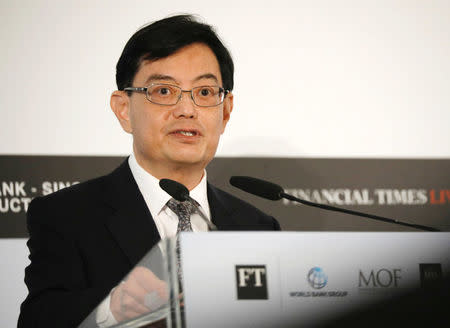Factbox: Who is in the running to be Singapore's next prime minister?
SINGAPORE (Reuters) - Singaporeans are waiting to find out who will be anointed to take over from Prime Minister Lee Hsien Loong and become the city-state's fourth leader since its independence in 1965.
Current PM Lee, the eldest son of Singapore's founding father Lee Kuan Yew, said he intends to step down in coming years. Singapore needs to hold its next general election by early 2021.
The decision will be taken by a group of 16 so-called fourth-generation leaders, all government ministers, who have been asked to choose the next leader from within their own ranks. There is no specific deadline for their decision.
Singapore's media and political analysts have narrowed the list of potential successors down to three most likely candidates - Finance Minister Heng Swee Keat, Education Minister Ong Ye Kung and cabinet member Chan Chun Sing - but there remains no obvious frontrunner.
BACKGROUNDS
All three contenders are ethnically Chinese, and went to the same elite high school - Raffles Institution, formerly known as Raffles Junior College. A third of the city-state's current cabinet members, and half of the so-called fourth generation of 16 leaders tasked with picking PM Lee's successor, also came from the same school.
Heng, Ong and Chan were awarded government scholarships, and all three read economics at top British universities, with Heng and Chan at Cambridge University, and Ong at the London School of Economics.
The scholarships they earned required them to go straight into public service after university.
HENG SWEE KEAT, 57
Heng, currently finance minister, was the managing director of the Monetary Authority of Singapore, the island-state's central bank, from 2005 to 2011, including the years of the global financial crisis.
After leaving university, Heng joined the Singapore police force, rising through the ranks to assistant commissioner.
He then held various public service positions, including principal private secretary to then-senior minister Lee Kuan Yew from 1997-2000. He was also chief executive officer of Singapore's Trade Development Board.
After the 2011 election, Heng was appointed education minister, and took up his current finance post in 2015.
In 2016, Heng collapsed from a stroke during a cabinet meeting. That led to questions about whether he would be fit enough to be the next leader.
ONG YE KUNG, 48
Ong, the education minister, served as PM Lee's press secretary from 1997-2003 and then as his principal private secretary from 2003-2005.
In 2005, Ong took over as the chief executive of the government's Workforce Development Agency, and three years later became deputy secretary general of the country's national confederation of labor unions.
Ong's first foray into parliamentary politics in 2011 didn't go so well - he was part of a group of PAP candidates defeated by the opposition Workers' Party.
As he waited to stand again, he worked as director of group strategy at Keppel Corp, which his owned by Singapore state investor Temasek Holdings and whose businesses range from rig building to property development.
After winning a seat at the 2015 elections, he immediately entered cabinet as acting education minister. In 2016, he took on the education post permanently and also became the second minister in the defense ministry.
CHAN CHUN SING, 48
As minister in the prime minister's office, Chan sits in cabinet but does not hold a portfolio.
Before entering politics, he spent 24 years in the Singapore military, rising to Chief of Army in 2010.
He became a member of parliament after the 2011 general election and was appointed acting minister for community development, youth and sports, and served in the communications ministry. He later served as minister for social and family development.
Chan also currently heads the NTUC, the labor union confederation.
Chan said that he, and his colleagues in the fourth generation of leaders, are all prepared to become PM if called upon.
(Reporting by Fathin Ungku and Dewey Sim; Editing by John Geddie and Martin Howell)



